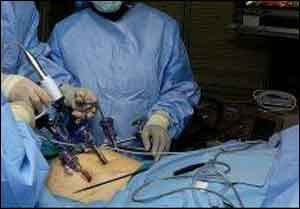- Home
- Editorial
- News
- Practice Guidelines
- Anesthesiology Guidelines
- Cancer Guidelines
- Cardiac Sciences Guidelines
- Critical Care Guidelines
- Dentistry Guidelines
- Dermatology Guidelines
- Diabetes and Endo Guidelines
- Diagnostics Guidelines
- ENT Guidelines
- Featured Practice Guidelines
- Gastroenterology Guidelines
- Geriatrics Guidelines
- Medicine Guidelines
- Nephrology Guidelines
- Neurosciences Guidelines
- Obs and Gynae Guidelines
- Ophthalmology Guidelines
- Orthopaedics Guidelines
- Paediatrics Guidelines
- Psychiatry Guidelines
- Pulmonology Guidelines
- Radiology Guidelines
- Surgery Guidelines
- Urology Guidelines
Laparoscopic Antireflux Surgery 18 percent failure noted : JAMA

Among patients who underwent laparoscopic antireflux surgery, about 18 percent experienced recurrent gastroesophageal reflux disease (GERD) requiring long-term medication use or secondary antireflux surgery, according to a study published by JAMA.
Gastroesophageal reflux disease is a public health concern in the Western world, affecting approximately 10 to 20 percent of all adults, and its prevalence has increased in the past two decades. Laparoscopic antireflux surgery with fundoplication (strengthens the valve between the esophagus and stomach) is a treatment alternative in patients with inadequate response to pharmacological treatment. Reflux recurrence after laparoscopic antireflux surgery has not been assessed in a long-term population-based study of unselected patients.
John Maret-Ouda, M.D., of the Karolinska Institutet, Karolinska University Hospital, Stockholm, Sweden, and colleagues conducted a study that included 2,655 patients who underwent laparoscopic antireflux surgery. The patients were followed up for a median of 5.6 years; 17.7 percent had reflux recurrence; 83.6 percent received long-term antireflux medication, and 16.4 percent underwent secondary antireflux surgery. Risk factors for reflux recurrence included female sex (22 percent of women vs. 13.6 percent of men had recurrence of reflux), older age, and comorbidity. Hospital volume of antireflux surgery was not associated with risk of reflux recurrence.
“Laparoscopic antireflux surgery was associated with a relatively high rate of recurrent GERD requiring long-term treatment, diminishing some of the benefits of the operation,” the authors write.
Several limitations of the study are noted in the article, including that there might be variations in clinical practice in regard to coding, especially for diagnoses that are not the primary reason the patient seeks health care.
For more details and to read the full study click on the following link: http://jamanetwork.com/journals/jama/fullarticle/10.1001/jama.2017.10981

Disclaimer: This site is primarily intended for healthcare professionals. Any content/information on this website does not replace the advice of medical and/or health professionals and should not be construed as medical/diagnostic advice/endorsement or prescription. Use of this site is subject to our terms of use, privacy policy, advertisement policy. © 2020 Minerva Medical Treatment Pvt Ltd